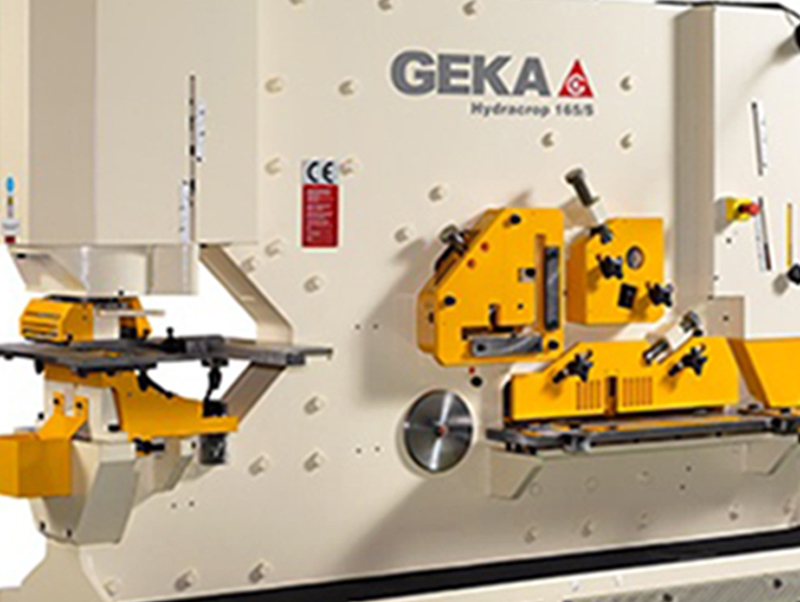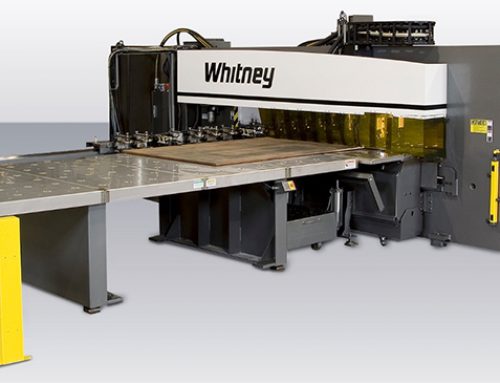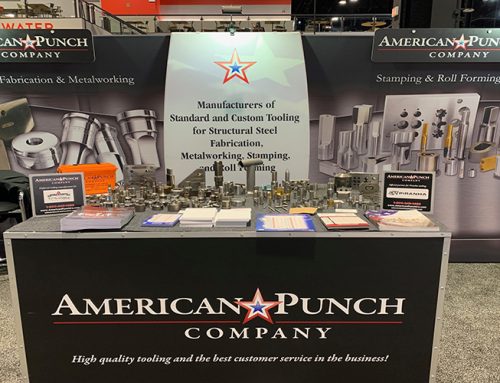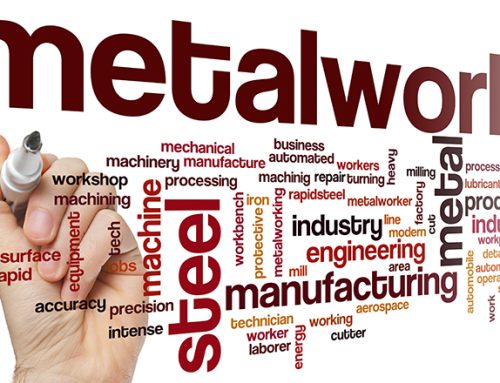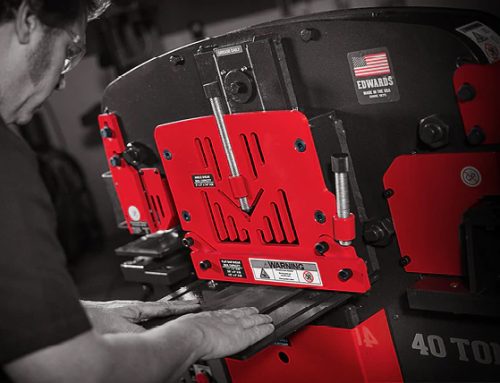As most people in the manufacturing industry know, ironworkers are a necessity in nearly every metal fabrication shop. These machines are essential to most shops. They are the preferred choice for punching, shearing, notching, coping, and bending. Additionally, they are used for many other fabrication processes.
We continue our deep dive into the top ironworker machines in the industry with Geka. In this blog, we will cover the Geka Ironworker. We’ll explore factors that play a part in deciding on which machine is right for your shop. There are factors like price, ease of use, functionality and delivery that play important roles in the decision-making process.
What Makes Geka Ironworkers Unique
Geka Ironworkers stand out from the crowd due to their unique features and qualities. One of their key advantages is the dual-cylinder hydraulic system, which offers superior power and efficiency compared to single-cylinder systems. This design ensures balanced force distribution, resulting in precise and uniform punching, shearing, and bending operations.
Another standout feature of Geka Ironworkers is their multi-functionality. These machines can perform multiple operations within a single unit, including punching, shearing, notching, bending, and more. Geka Ironworkers are versatile, saving space and money by replacing multiple specialized machines for metalworking tasks.
Geka Ironworkers also boasts a robust construction, built with heavy-duty frames and components to withstand demanding industrial applications. They have a design that prioritizes longevity, stability, and precision. Geka focuses on operator safety by adding safety features like dual-handed controls, emergency stops, and safety guards to their Ironworkers.
Overall, Geka Ironworkers combine their dual-cylinder hydraulic system, multifunctionality, robust construction, and advanced safety features to provide a reliable and efficient solution for a wide range of metal fabrication needs. These machines offer versatility, user-friendliness, and customization options, making them a valuable asset in various industries that require high-quality metalworking operations.
Top Differentiators of Geka Ironworkers
Several key differentiators distinguish Geka Ironworkers from other machines in the market. Here are the top factors that set Geka Ironworkers apart:
- Dual-Cylinder Hydraulic System: Geka Ironworkers feature a dual-cylinder hydraulic system. This provides superior power, precision, and balance compared to single-cylinder systems. The design ensures consistent force distribution, resulting in accurate and uniform metalworking operations.
- Multi-functionality and Versatility: Geka Ironworkers are renowned for their multi-functionality. They can perform a wide range of metalworking tasks within a single machine, including punching, shearing, notching, bending, and more. This versatility eliminates the need for multiple specialized machines, streamlining the metal fabrication process and reducing costs.
- Robust Construction and Durability: Geka Ironworkers are built with heavy-duty frames and components, ensuring exceptional durability and reliability. Their design helps them withstand demanding industrial applications and extended usage. The robust construction of Geka Ironworkers enhances stability, precision, and longevity, providing a reliable solution for heavy-duty metalworking tasks.
- Advanced Safety Features: Geka prioritizes operator safety, and their Ironworkers are equipped with advanced safety features. These include dual-handed controls, emergency stops, and safety guards, ensuring the protection of the operator during machine operation. Geka Ironworkers comply with stringent safety standards, providing peace of mind for operators and maintaining a safe working environment.
- Customization Options: Geka offers customization options for their Ironworkers, allowing customers to tailor the machines to their specific requirements. This includes choosing the tonnage capacity, throat depth, workstations, and additional features. The ability to customize Geka Ironworkers ensures that they can adapt to various industries and applications, meeting the unique needs of customers.
These differentiators make Geka Ironworkers stand out as reliable, versatile, and safety-conscious machines in the metalworking industry. With their dual-cylinder hydraulic system, multifunctionality, robust construction, advanced safety features, and customization options, Geka Ironworkers offers a comprehensive solution for efficient and precise metal fabrication.
Top Industries Geka Ironworkers Are Good For
Geka ironworkers are versatile machines that find applications in a wide range of industries. Geka ironworkers are commonly used in the following top industries:
- Metal Fabrication: Geka ironworkers are extensively utilized in metal fabrication industries. They excel at punching, shearing, bending, and notching metal sheets, plates, and profiles. Metal fabricators use Geka ironworkers to produce a variety of components and structures for industries such as construction, automotive, aerospace, and manufacturing.
- Construction: Geka ironworkers play a crucial role in the construction industry, where metalworking tasks are prevalent. They are used to cut and shape steel beams, angle iron, and other structural members for building frameworks, bridges, and infrastructure projects. Geka ironworkers enable precise and efficient fabrication of metal components required in construction.
- Automotive and Transportation: The automotive and transportation industries often require metalworking operations for manufacturing vehicle parts, chassis, frames, and components. Geka ironworkers are utilized for punching holes, notching, shearing, and bending metal sheets and plates to produce parts and assemblies used in automobiles, trucks, trailers, and other transportation vehicles.
- Manufacturing: Geka ironworkers are employed in various manufacturing industries that involve metalworking processes. From producing machinery parts and equipment to fabricating metal components for consumer goods, Geka ironworkers offer versatility and efficiency. They are capable of handling different materials and thicknesses, making them ideal for manufacturing applications.
- Shipbuilding: Shipbuilding and marine industries rely on Geka ironworkers for their metalworking needs. These machines can be used to cut and shape metal plates for hulls, decks, frames, and other structural elements of ships and vessels. Geka ironworkers contribute to the precision and speed required in shipbuilding processes.
- Energy and Power Generation: Geka ironworkers are also utilized in the energy and power generation sectors. They are used to fabricate metal components for power plants, including supports, brackets, and panels. Geka ironworkers enable the efficient production of parts used in renewable energy systems, such as wind turbines and solar panel structures.
These industries represent just a few examples of where Geka ironworkers find significant application. Their versatility, reliability, and capability to perform a variety of metalworking operations make them valuable assets in many sectors that require efficient and precise fabrication of metal components.
Top 5 Geka Ironworker Maintenance Opportunities
Geka ironworkers are robust machines used for metalworking applications. While they are built to withstand heavy use, there are certain parts that can experience wear and tear and require maintenance over time. Here are some common Geka ironworker parts to focus on maintenance:
- Hydraulic components: Geka ironworkers utilize hydraulic systems to power their punching, shearing, and bending operations. hydraulic cylinders, seals, valves, and pumps can wear out or develop leaks due to high pressures, friction, or inadequate maintenance. This can result in reduced performance, loss of hydraulic power, or fluid leakage.
- Punches and dies: Punches and dies are critical components of Geka ironworkers for creating holes or shapes in metal. These tools can wear down, become dull, or break due to repetitive use, improper maintenance, or excessive force. Damaged punches and dies can lead to poor-quality cuts or inaccuracies in hole sizes.
- Shear blades: Geka ironworkers employ shear blades to cut metal sheets or plates. These blades can wear out or become dull over time, resulting in reduced cutting efficiency, jagged edges, or inadequate shearing performance. Insufficient lubrication or improper adjustment can also contribute to shear blade wear and tear.
- Electrical components: Geka ironworkers incorporate various electrical elements, including motors, switches, relays, and control panels. These components can experience wear such as motor burnout, relay malfunctions, or electrical connection issues. Environmental factors like dust, moisture, or voltage fluctuations can contribute to electrical issues.
- Bearings and bushings: Geka ironworkers rely on bearings and bushings to support moving parts and reduce friction. Over time, these components can wear out due to insufficient lubrication, contamination, or excessive loads. Damaged bearings and bushings can lead to increased noise, vibration, and decreased overall performance.
Regular inspection, maintenance, and timely replacement of worn or damaged parts are essential to prevent or minimize these common Geka ironworker parts to replace. It is advisable to follow the manufacturer’s guidelines and recommendations for maintenance and replacement intervals to ensure optimal machine performance and longevity.
How to Keep Your Geka Machines Running
Maintenance, spare parts and proper use are three of the most important factors in keeping your Geka machines up and running. One of the most overlooked machine maintenance efforts for fabrication shops is proper machine and punch lubrication. Lubrication can help improve the life of punch and die tools. It reduces friction, lubricates the tool, removes heat, prevents scoring and avoids punch galling.
It’s important to have the right spare parts for your machine to keep it running smoothly. There are several Geka ironworker parts that you should have in-house that include:
- Punch and dies in a variety of sizes
- Oversized Tooling
- Offset Tooling
- Shear blades
- Coupling Nuts
- Quick Change Sleeves
Our metal fabrication team always seeks to enhance production, minimize waste, and decrease wear on your punches and dies. We know that every metal fabrication shop has its own unique challenges and opportunities. You can explore more reasons for punch failure on our site. And our team is here to help by improving tooling designs, production processes and more, contact our team for advice on your individual situation and needs.
If you have another brand of ironworker machine, American Punch has you covered there too. We stock a large inventory of punches, dies, shear blades and other tooling for the top brands in the industry. Check out tooling for your ironworker machine brand today.

